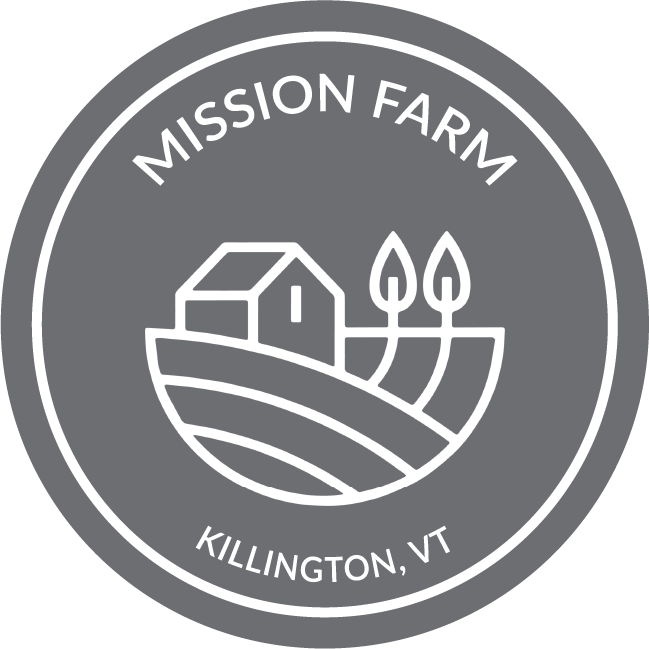At Mission Farm, “The Church is called to feed”
July 7th, 2021 | Story by Ethan Weinstein | Originally Posted in the Mountain Times
By Ethan Weinstein - A hen struts in front of the Church of Our Saviour at Mission Farm.
After a 40-year hiatus from farming, Mission Farm in Killington is working the land once again. Their goal: address the community’s needs through food and faith.
Led by Executive Director Reverend Lisa Ransom and “Farm Priest” Reverend Rachel Field, three summer interns have joined the team. These divinity school students, planting rows of potatoes and attending to roving lambs, have started to manifest Mission Farm’s vision of regenerative, altruistic agriculture.
Caity Stuart, a student at Yale Divinity School and one of Mission Farm’s interns, walked up to the pen holding the farm’s three sheep. The trio became local celebrities last month when they escaped their enclosure, spending five days as fugitives.
“The sheep are regenerative grazing,” Stuart said. “If you want to be sequestering carbon, you’ll be doing regenerative farming.”
Stuart and her peers allow the sheep to graze in areas of poor soil quality. The sheep eat the grass, aerate the soil with their hooves, and defecate, enriching the land. Then, the sheep are allowed to graze a new patch, and the process begins again.
In addition to sheep, Mission Farm has a number of hens that strut through the grounds. Several vegetable beds rise adjacent to the henhouse, producing tomatoes, kale, herbs and garlic. The Church of Our Savior, a gray stone structure, stands stark before the dense green slope behind. This land has been part of the Episcopal Church since 1817. Trails meander the flood plane along the Ottauquechee and back into the wooded hills.
At the crest of the hill behind the church lies a “three sisters” garden — squash, corn, and beans. Mission Farm received these seeds from a local Abenaki tribe. Once it harvests the produce, Mission Farm will deliver the vegetables back to the tribe to distribute as they see fit. It’s part of the organization’s desire to use the land to give back, combining Christian virtues with Vermont’s fertile hills.
“People are becoming interested in exploring their faith in new ways,” said Ransom, Mission Farm’s executive director. It’s this interest that has attracted the farm’s new crop of young people.
By Ethan Weinstein - The Church of Our Saviour at Mission Farm is a working farm with a dual mission.
“I was raised a Christian, but I’ve been challenged by my faith for some time,” said Stuart. She wore sandals and a flannel as she tended to her morning chores. “I realized that something was missing in all of these conversations, especially with the climate crisis — looming for some people, already present for many others. We need psychiatrists, we need scientists, we need educators. And we need people speaking a spiritual language for those who are trying to understand how to process.”
For some young Christians, especially those who have felt pushed out by the church, Christianity means much more than attending Sunday services. Stuart falls into this category. Mission Farm presented an opportunity for her to explore spirituality while connected to the natural world. “I’ll be honest, coming off a year of Zoom classes and being in quarantine, to have an opportunity to retreat to Vermont with people and to put my hands in the soil: When I heard about this opportunity, everything in me just said Yes, this is where I need to be. I literally said, ‘You need to hire me,’” Stuart laughed.
“For a long time, I have felt called to this kind of work,” said Jimmy Pickett, an intern who joined Mission Farm from Virginia Seminary School. “My great, great grandparents were dairy and tobacco farmers in Western Mass. My grandpa and my aunt have always had gardens. I’ve always felt most at home in the soil and in the church. And figuring out how to bring those two together has been a real passion of mine.”
“The church is called to feed people. And the church in general has a lot of land. So figuring out how to use that land that the church owns to follow our call to feed people has just kept me going,” Pickett said.
Mission Farm has risen to the challenge. Throughout the pandemic, it helped distribute over 900 meals through Vermont’s Everyone Eats initiative. The program funneled federal relief funds to restaurants, which then cooked meals for those in need. Mission Farm volunteered as a distribution site.
Rachel Field, the organization’s farm priest, manages the grounds’ agriculture. When not at Mission Farm, Field works at a dairy farm in Randolph and an Episcopal Church in Brandon. But she sees all her work as being the same. “I can’t farm without being a priest,” she said. “It’s one vocation, I just live it out in different places.”
Field and Ransom have led Mission Farm for only a year and half, but already they’ve tilled the hillside into providing nourishment. They’re still listening to the community, figuring out how best to aid: Maybe a community garden, or maybe ready-made beds for locals to plant themselves. Their excitement is palpable, and the land is transforming before them. The best, no doubt, is yet to come.



